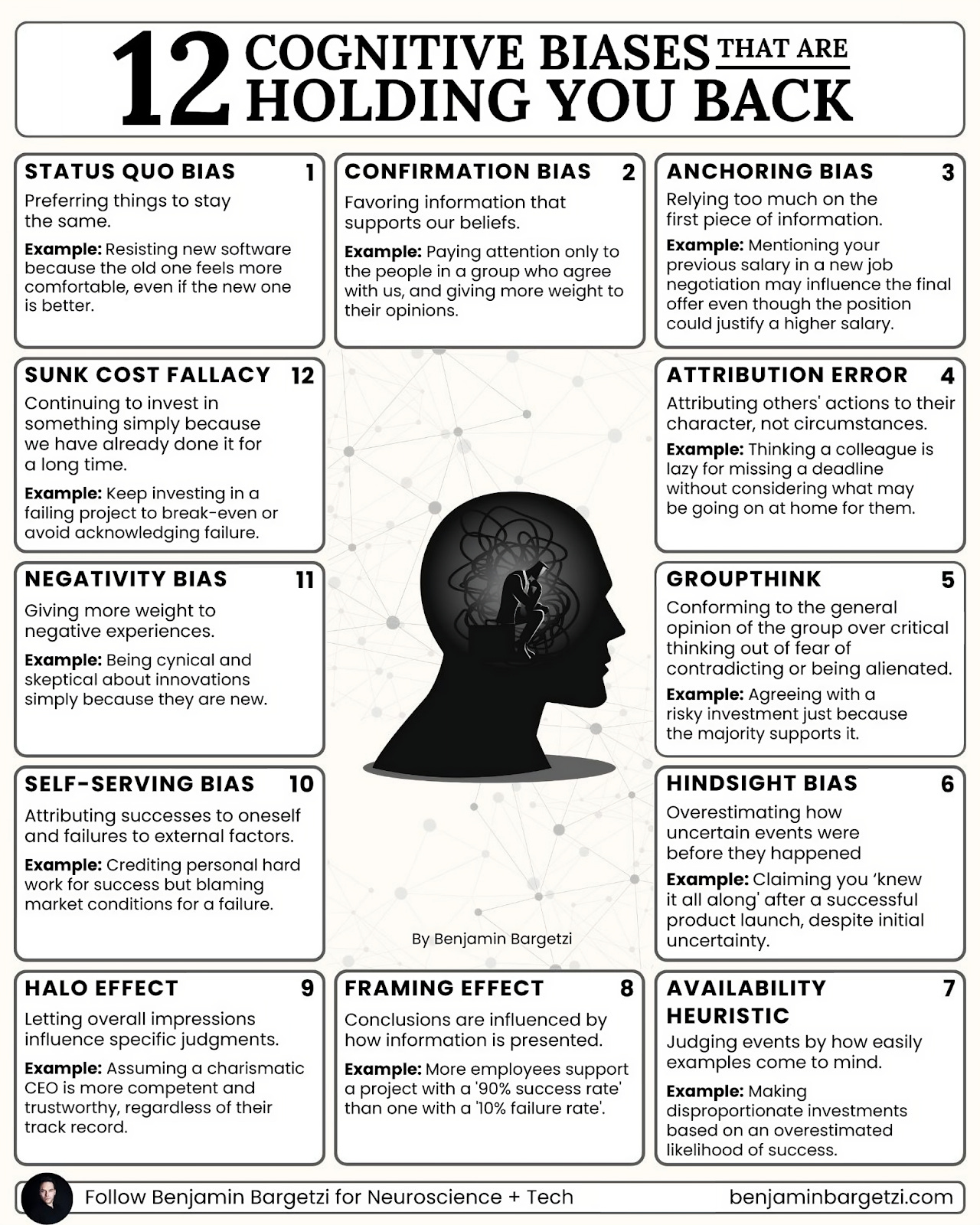Today at a Glance:
Career Tip: The 3 worst pieces of career advice
Expert Insight: Job simulations boost hiring potential
Study Finding: The most in-demand jobs on LinkedIn (Q1 2024)
Book Lesson: Start preparing for your second career early
Cheat Sheet: 12 cognitive biases that are holding you back
Career Tip: The 3 Worst Pieces of Career Advice
Coach: Dora Vanourek
Bad Career Advice #1: Find a secure job and stick with it
Why it’s a trap:
Sticking to a job solely for security can lead to stagnation, missed growth opportunities, and dissatisfaction
No job is ever secure
A smarter move:
Regularly assess your job satisfaction and growth opportunities
Learn continuously
Be open to new opportunities that align with your skills and passions
Bad Career Advice #2: Hard work always pays off
Why it’s a trap:
Hard work alone doesn’t guarantee anything. It can lead to a lack of recognition, exploitation, and burnout
A smarter move:
Communicate your progress and achievements
Ensure that your efforts are recognized and rewarded
Bad Career Advice #3: Keep your head down and do your job
Why it’s a trap:
Lack of visibility will hinder your career growth
A smarter move:
Take initiative and seek out new projects
Make your achievements known
Networking and visibility are key to career advancement
To read 4 more worst career advice, click here.
Expert Insight: Job Simulations Boost Hiring Potential
Every month, I interview CEOs, business leaders, and industry experts on various career-related topics and the future of work. In this section, I share the most relevant insights from those conversations.
Expert: Andrew Gilfillan, General Manager at Pearson
Key takeaway:
Students using Forage make up nearly 20% of employers’ early talent hires.
Additional insights:
Virtual job simulations connect coursework with real-world applications.
Job simulations help students gain confidence and practical experience that can be highlighted in job interviews.
A good strategy is to blend traditional college degrees with different learning paths, including online courses and certifications.
Read the full interview: How Job Simulations are Revolutionizing Career Prep for College Students
Study Findings: The Most In-Demand Jobs on LinkedIn (Q1 2024)
Researcher: LinkedIn
Key findings:
Sales positions continue to grow
Top ten most in-demand jobs:
Salesperson
Retail Salesperson
Software Engineer
Registered Nurse
Project Manager
Sales Manager
Customer Service Representative
Full Stack Engineer
Business Analyst
Data Engineer
Read the full report here.
Book Lesson: Start preparing for your second career early
Book: Managing Oneself
Author: Peter Drucker
I read this book in my early 30s, and it changed my life. I never viewed my career the same way again. The ideas I discovered in the book have influenced everything I've done since then.
Key lesson:
Plan ahead and choose a new career that matches your strengths and interests
Additional takeaways:
Begin preparing for a second career long before you enter it, ideally 10-20 years in advance.
Develop parallel careers.
Understand what you excel at and how these skills can be applied in a new field.
A second career helps maintain mental acuity and purpose in later life.
Choose a second career that aligns with your values and provides a sense of meaning.
Cheat Sheet: 12 Cognitive Biases that Are Holding You Back
Creator: Benjamin Bargetzi






Reminds me of James Clear towards the end of Atomic Habits:
Explore/exploit trade off with skills:
- Explore at the beginning
- Exploit the closer to the finish line
- If you are winnning: exploit
- If you are losing: explore
- In the long-run, 80-90% exploring, 10-20% exploring
I guess the challenge is to figure out the right timing and define 'winning' / 'losing'
How do you decide what you will be doing in 10-20 years?